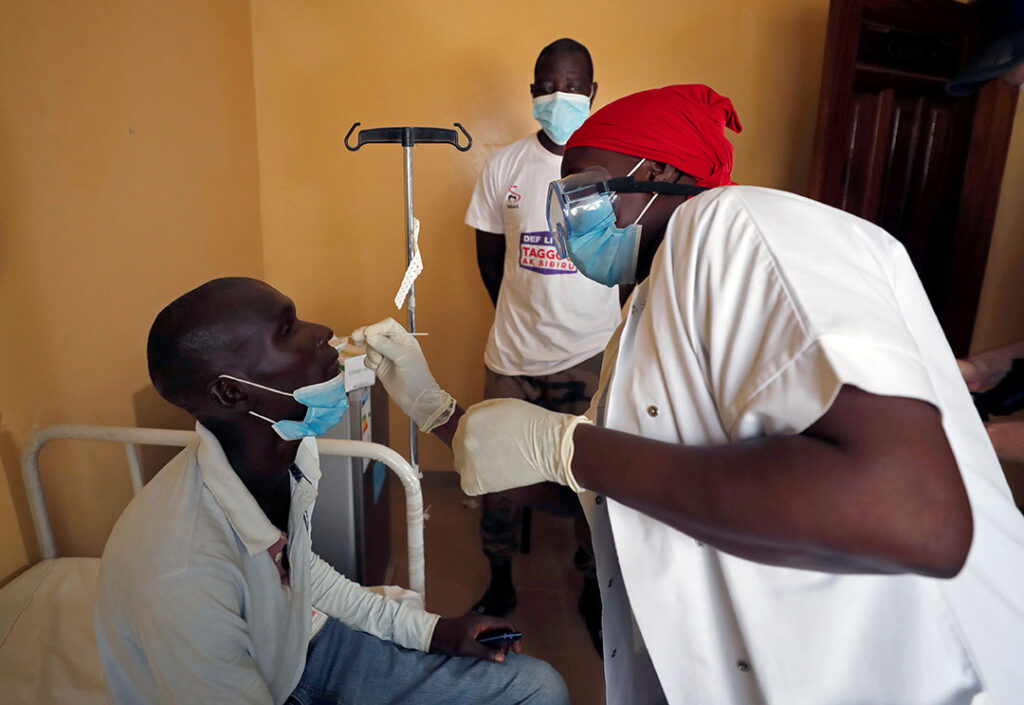ADF STAFF
Although Senegal has limited medical capacity and only seven doctors for every 100,000 people, it is being praised for its successful COVID-19 response. Observers say the country is using its deep experience with disease outbreaks and cutting-edge medical innovations to keep infection rates low.
“Senegal, like all other countries in Sub-Saharan Africa, is used to managing outbreaks and has the experience and capacity to respond,” Lucile Imboua, Senegal country coordinator at the World Health Organization (WHO), told the Devex website. “The experience gained from the Ebola outbreak has been useful in triggering preparedness and response interventions.”
After COVID-19 hit, Senegal quickly closed its schools, imposed a strict curfew, banned public gatherings and halted international commercial flights, among other measures. The government also put up $115 million to strengthen the health sector, stimulate the economy and help people pay for food, water and electricity.
Senegal’s health officials implemented widespread testing, isolated infected people and deployed “a large number of community health workers to follow through with the contact tracing and support some of the case management,” Dr. John Nkengasong, director of the Africa Centres for Disease Control and Prevention, told Devex.
In Dakar, Senegal’s capital, the Pasteur Institute was one of the first two African laboratories that was able to test for COVID-19, and its medical workers helped train staffers from dozens of African countries to administer the tests. The institute’s lab is now open 24 hours a day, and testing is available throughout the country. Testing is free for people with COVID-19 symptoms, and results are available in eight hours.
Amadou Sall, chief virologist at the Pasteur Institute, has partnered with Mologic, a United Kingdom company, to develop two COVID-19 home test kits. One, a swab test, can determine whether someone already has the virus. The other can determine whether someone has developed COVID-19 antibodies from a previous infection. The test to determine whether someone has an active case of the virus could be released by the end of the year, the BBC reported.
The antibody test will work like a pregnancy test, cost about $1 and produce results in 10 minutes. Sall told the BBC in early October that the antibody test should available “in the coming weeks.”
To help combat COVID-19, engineering students at Ecole Superieure Polytechnique in Dakar invented automatic hand sanitizers and a robot capable of measuring patients’ blood pressure and temperature.
Guided by a mounted camera and controlled by an app, the tiny robot, called “Dr. Car,” reduces medical workers’ contact with infected patients and the use of personal protective equipment, student Lamine Mouhamed Kebe told Agence France-Presse.
“At a certain point we realized that medical equipment was limited,” Kebe said, adding that working on the inventions made students feel patriotic.
Although Senegal has avoided the worst-case scenarios, experts urge vigilance.
“We should be very careful that we do not over-project any successes,” Nkengasong told Devex. “This is a very delicate virus. It spreads quickly. And we have seen, and are currently seeing, trends in Europe where, until a few weeks ago, the numbers were decreasing. Now we are beginning to see significant increases.”

